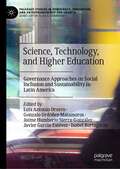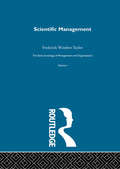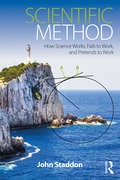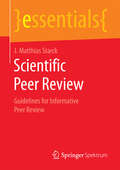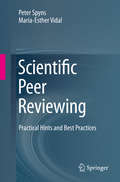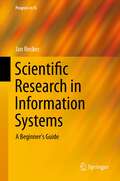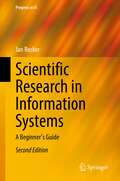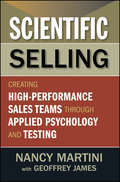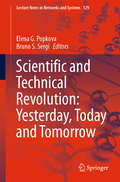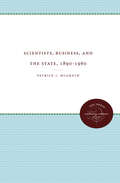- Table View
- List View
Science, Technology, and Higher Education: Governance Approaches on Social Inclusion and Sustainability in Latin America (Palgrave Studies in Democracy, Innovation, and Entrepreneurship for Growth)
by Gonzalo Ordóñez-Matamoros Luis Antonio Orozco Jaime Humberto Sierra-González Isabel Bortagaray Javier García-EstévezThis volume explores the governance and management of science, technology, and innovation (STI) in relation to social inclusion and sustainability, highlighting its goal, challenges, and opportunities. Divided into two sections, it addresses the goals and institutional arrangements around sustainable development in the context of Latin American countries as well as the challenges of developing absorptive STI capacities for inclusion in the higher education institutions and systems. The chapters tackle the important role of citizen science, science diplomacy, peace building, mission-oriented policies, public innovation, institutional entrepreneurs, and policy networks. Researchers and scholars will find an opportunity to better grasp several topics and methodologies in knowledge development in the governance of STI. This interdisciplinary work presents original research on science, technology and innovation policy and governance studies in an understudied region.
Scientific Cosmology and International Orders (Cambridge Studies In International Relations #147)
by Bentley B. AllanScientific Cosmology and International Orders shows how scientific ideas have transformed international politics since 1550. <P><P>Allan argues that cosmological concepts arising from Western science made possible the shift from a sixteenth century order premised upon divine providence to the present order centred on economic growth. As states and other international associations used scientific ideas to solve problems, they slowly reconfigured ideas about how the world works, humanity's place in the universe, and the meaning of progress. <P>The book demonstrates the rise of scientific ideas across three cases: natural philosophy in balance of power politics, 1550–1815; geology and Darwinism in British colonial policy and international colonial orders, 1860–1950; and cybernetic-systems thinking and economics in the World Bank and American liberal order, 1945–2015. Together, the cases trace the emergence of economic growth as a central end of states from its origins in colonial doctrines of development and balance of power thinking about improvement.<P> Outlines how scientific ideas have shaped international politics.<P> Reveals the far-reaching power and influence of the natural and social sciences on international politics.<P> Presents a new macrohistorical narrative of the development of the international system.<P>
Scientific Glass Incorporated: Inventory Management (Brief Case)
by Steven C. Wheelwright William SchmidtScientific Glassware is a fast-growing, privately held company that provides specialized glassware for laboratory and research facilities. Excess inventory is tying up extra capital needed to fund the company's expansion plans. The newly hired Manager of Inventory Planning is tasked with developing an effective strategy for managing inventory without requiring additional capital investment. The company has launched several initiatives, such as adding a dedicated domestic sales force, which directly affect inventory requirements. At the same time, the company has announced a commitment to improve customer responsiveness and reduce the "fill rate," the time it takes to fulfill new orders. These changes may require adding warehouses or outsourcing fulfillment services. This case focuses on the business challenges of inventory control and order processing, particularly the tradeoffs between centralized and decentralized inventories. Students must complete a quantitative analysis of the costs and benefits of several alternatives.
Scientific Glass Incorporated: Inventory Management (Brief Case)
by Steven C. Wheelwright William SchmidtScientific Glassware is a fast-growing, privately held company that provides specialized glassware for laboratory and research facilities. Excess inventory is tying up extra capital needed to fund the company's expansion plans. The newly hired Manager of Inventory Planning is tasked with developing an effective strategy for managing inventory without requiring additional capital investment. The company has launched several initiatives, such as adding a dedicated domestic sales force, which directly affect inventory requirements. At the same time, the company has announced a commitment to improve customer responsiveness and reduce the "fill rate," the time it takes to fulfill new orders. These changes may require adding warehouses or outsourcing fulfillment services. This case focuses on the business challenges of inventory control and order processing, particularly the tradeoffs between centralized and decentralized inventories. Students must complete a quantitative analysis of the costs and benefits of several alternatives.
Scientific Management (The\making Of Sociology Ser.)
by Frederick Winslow TaylorThis volume comprises three works originally published separately as Shop Management (1903), The Principles of Scientific Management (1911) and Testimony Before the Special House Committee (1912). Taylor aimed at reducing conflict between managers and workers by using scientific thought to develop new principles and mechanisms of management. In contrast to ideas prevalent at the time, Taylor maintained that the workers' output could be increased by standardizing tasks and working conditions, with high pay for success and loss in case of failure. Scientific Management controversially suggested that almost every act of the worker would have to be preceded by one or more preparatory acts of management, thus separating the planning of an act from its execution.
Scientific Management at Merck: An Interview with CFO Judy Lewent
by Nancy A. Nichols Judy LewentRisk, complexity, and uncertainty currently define the business environment of the 1990s. In this interview, Merck CFO Judy Lewent talks about her scientific approach to finance, one that is both long term in nature and eminently tied to Merck's overall strategy. At 44 years of age, Lewent ranks among the most powerful women in corporate America and is the only woman to hold the title of CFO at a major corporation.
Scientific Method: How Science Works, Fails to Work, and Pretends to Work
by John StaddonThis book shows how science works, fails to work, or pretends to work, by looking at examples from such diverse fields as physics, biomedicine, psychology, and economics. Social science affects our lives every day through the predictions of experts and the rules and regulations they devise. Sciences like economics, sociology and health are subject to more ‘operating limitations’ than classical fields like physics or chemistry or biology. Yet, their methods and results must also be judged according to the same scientific standards. Every literate citizen should understand these standards and be able to tell the difference between good science and bad. Scientific Method enables readers to develop a critical, informed view of scientific practice by discussing concrete examples of how real scientists have approached the problems of their fields. It is ideal for students and professionals trying to make sense of the role of science in society, and of the meaning, value, and limitations of scientific methodology in the social sciences.
Scientific Method: How Science Works, Fails to Work, and Pretends to Work
by John StaddonThis expanded second edition of Scientific Method shows how science works, fails to work or pretends to work by looking at examples from physics, biomedicine, psychology, sociology and economics.Scientific Method aims to help curious readers understand the idea of science, not by learning a list of techniques but through examples both historical and contemporary. Staddon affirms that if the reader can understand successful studies as well as studies that appear to be scientific but are not, they will become a better judge of the “science” in circulation today. To this end, this new edition includes a new chapter, What is Science?, which points out that science, like any human activity, has its own set of values, with truth being the core. Other new chapters focus on the emergence of AI and machine learning, science and diversity, and behavioral economics. The book also includes textual features such as bullet-points and text boxes on topical issues.Scientific Method is essential reading for students and professionals trying to make sense of the role of science in society, and of the meaning, value and limitations of scientific methodology.
Scientific Peer Review: Guidelines for Informative Peer Review (essentials)
by J. Matthias StarckJ. Matthias Starck comprehensively guides the reader in this essential through all steps of writing an expert review for a scientific journal. It is built on a succinct analysis how science works, how science is communicated and how science is published. It provides a critical guide how to write good, informative and fair peer reviews. The author presents a critical discussion of different peer review procedures and their alternatives, explains ethical guidelines as well as the dark sides of scientific publishing. So this essential helps the reader to perform better in the existing system and to contribute to its further development and improvement.
Scientific Peer Reviewing
by Peter Spyns María-Esther VidalThis booklet provides a practical introduction to the practice of peer reviewing. Although it mainly focuses on paper reviewing for scientific events in computer science and business informatics, many of the principles, tips, tricks and examples can also be applied to journal reviewing and other scientific domains. Some can also be used when reviewing proposals for research projects or grants. In addition, many aspects of the book will benefit authors of scientific papers, who will gain deeper insights into how papers are reviewed and hence what to pay attention to when writing their own papers. The book is divided into three chapters, the first of which presents a brief overview of why peer reviewing is considered to be an important quality control instrument for scientific papers. In turn, the second chapter elaborates on the main principles a good reviewer should adhere to, including the most important aspects of personal attitude s/he should pay attention to when writing his/her review. Lastly, the third chapter features a series of (anonymized) real life examples of actual reviewing practice, thus illustrating practical tips and tricks regarding the most common "do's" and "don'ts" of peer reviewing. The book offers a structured introduction and practical reference guide, including good and bad examples, for junior researchers in computer science and business informatics in particular, as well as for anyone interested in peer reviewing in general.
Scientific Publishing Ecosystem: An Author-Editor-Reviewer Axis
by Manoj Pandey Prathamesh P. Churi Payal B. JoshiThe book aims to converge the perspectives of authors, editors, and reviewers to discuss modern scientific publishing practice and emerging concerns in the contemporary world. Authors, editors, and reviewers form a triage in a publishing ecosystem which is witnessing a huge pressure due to changing evaluation criteria for career progression and grant funding. The major perspective of this book is to put forth the present-day emerging ills of modern publishing system and sensitize the research fraternity - be it young researchers or established scientists towards practicing good science and preserving spirit of scientific discoveries. The edited book consists of three parts viz, Part I “Authors, Authorship, and Scholarly Dissemination” features ten chapters devoted to describe authorship issues and good publication practice, plagiarism concerns, preprints, open access models, conflicting interests, rise of review papers, writing book reviews, and assessing faculty beyond metrics. Part II “Editors, Editorial Desks, and Issues of Scientific Misconduct” features eight chapters devoted to discuss on issues of editorial misconduct, desk rejections, paper mills, letters to editors, image duplication, emerging ChatGPT in writing/reviewing spaces, citation cartels, and retractions. Finally, Part III “Reviewers and Developing Evaluator’s Eye” features five chapters devoted to discuss peer review as an idea creating model, paying peer reviewers, training reviewers, peer review manipulations, and peer review in age of AI . All chapters in the book are written by expert contributors of the field that provides a systematic approach of understanding various challenges, opportunities, and ethical considerations of scientific publishing ecosystem. Most of the chapters have featured recent cases of scientific misconduct as examples to reflect scale of the problem. This book will serve as a reference to research practitioners in understanding assigning authorship on papers, modern-day publishing collaboration, role of editors to serve journals in a holistic manner and ensuring fair peer review mechanisms.
Scientific Research in Information Systems
by Jan ReckerThis book is designed to introduce doctoral and other higher-degree research students to the process of scientific research in the fields of Information Systems as well as fields of Information Technology, Business Process Management and other related disciplines within the social sciences. It guides research students in their process of learning the life of a researcher. In doing so, it provides an understanding of the essential elements, concepts and challenges of the journey into research studies. It also provides a gateway for the student to inquire deeper about each element covered . Comprehensive and broad but also succinct and compact, the book is focusing on the key principles and challenges for a novice doctoral student.
Scientific Research in Information Systems: A Beginner's Guide (Progress in IS)
by Jan ReckerThis book introduces higher-degree research students and early career academics to scientific research as occurring in the field of information systems and adjacent fields, such as computer science, management science, organization science, and software engineering. Instead of focusing primarily on research methods as many other textbooks do, it covers the entire research process, from start to finish, placing particular emphasis on understanding the cognitive and behavioural aspects of research, such as motivation, modes of inquiry, theorising, planning for research, planning for publication, and ethical challenges in research. Comprehensive but also succinct and compact, the book guides beginning researchers in their quest to do scholarly work and to assist them in developing their own answers and strategies over the course of their work. Jan Recker explains in this book the fundamental concepts that govern scientific research and then moves on to introduce the basic steps every researcher undertakes: choosing research questions, developing theory, building a research design, employing research methods, and finally writing academic papers. He also covers essentials of ethical conduct of scientific research. This second edition contains major updates on all these elements plus significant expansions on relevant research methods such as design research and computational methods, a rewritten and extended chapter on theory development, and expansions to the chapters on research methods, scientific publishing, and research ethics. A companion website provides pedagogical materials and instructions for using this book in teaching.
Scientific Selling: Creating High Performance Sales Teams through Applied Psychology and Testing
by Nancy MartiniSales managers have the most difficult job in the business world. They are responsible not just for revenue, but also for the hiring, coaching, training, and deployment of the employees who must generate it. Before the advancements that inspired Scientific Selling, sales managers had few tools to help them succeed at these disparate yet essential tasks. Today, however, the scientific approaches described in this book allow sales managers to more effectively measure, refine, and improve every aspect of the sales environment. Using easily-understood examples, graphics, charts, and explanations, Scientific Selling describes how to: Predictably improve sales results. Attract and retain top sales performers. Sharply decrease employee turnover. Spend sales training dollars more wisely. Better target sales coaching efforts. Move into consultative selling more quickly. And much more. Scientific Selling features over a dozen case studies illustrating exactly how scientific measurement and testing have improved sales performance within different kinds of sales groups inside multiple industries.
Scientific Tourism: Researchers as Travellers (Contemporary Geographies of Leisure, Tourism and Mobility)
by Carol Kline Andrew Holden Susan SlocumAs researchers in emerging economies, scientists are often the first foreign visitors to stay in remote rural areas and, on occasion, form joint venture ecotourism and community tourism projects or poverty alleviation schemes between local agencies or NGOs, the local community, and their home institution or agency. They therefore can contribute to avenues for the conservation of natural resources and the development of rural communities as well as influencing the future tourism development through its perceived legitimacy and the destination image it promotes. <P><P> This book for the first time critically reviews tourism debates surrounding this emerging market of scientific and research oriented tourism. It is divided into three inter-related sections. Section 1 sets the stage of the discourse of scientific research in tourism; Section 2 evaluates the key players of scientific tourism looking particularly at the roles of NGOs, government agencies and university academic staff and Section 3 contains case studies documenting the niche of researchers as travelers in a range of geographical locations including Tanzania, Australia, Chile, Peru and Mexico. The title’s multidisciplinary approach provides an informed, interesting and stimulating addition to the existing limited literature and raises many issues and associated questions including the role of science tourism in tourism development and expansion, the impacts of scientific and research-based tourism, travel behaviors and motivations of researchers to name but a few. <P><P> This significant volume will provide the reader with a better understanding of scientists as travelers, their relationship to the tourism industry, and the role they play in community development around tourism sites. It will be valuable reading for students and academics across the fields of Tourism, Geography and Development Studies as well as other social science disciplines.
Scientific and Technical Revolution: Yesterday, Today and Tomorrow (Lecture Notes in Networks and Systems #129)
by Elena G. Popkova Bruno S. SergiThis book presents a system view of the digital scientific and technological revolution, including its genesis and prerequisites, current trends, as well as current and potential issues and future prospects. It gathers selected research papers presented at the 12th International Scientific and Practical Conference, organized by the Institute of Scientific Communications. The conference “Artificial Intelligence: Anthropogenic Nature vs. Social Origin” took place on December 5–7, 2019 in Krasnoyarsk, Russia. The book is intended for academic researchers and independent experts studying the social and human aspects of the Fourth Industrial Revolution and the associated transition to the digital economy and Industry 4.0, as well as the creators of the legal framework for this process and its participants – entrepreneurs, managers, employees and consumers. It covers a variety of topics, including “intelligent” technologies and artificial intelligence, the digital economy, the social environment of the Fourth Industrial Revolution and its consequences for humans, the regulatory framework of the Fourth Industrial Revolution, and the “green” consequences, prospects and financing of the Fourth Industrial Revolution.
Scientists and Swindlers: Consulting on Coal and Oil in America, 1820–1890 (Johns Hopkins Studies in the History of Technology)
by Paul LucierIn this impressively researched and highly original work, Paul Lucier explains how science became an integral part of American technology and industry in the nineteenth century. Scientists and Swindlers introduces us to a new service of professionals: the consulting scientists. Lucier follows these entrepreneurial men of science on their wide-ranging commercial engagements from the shores of Nova Scotia to the coast of California and shows how their innovative work fueled the rapid growth of the American coal and oil industries and the rise of American geology and chemistry. Along the way, he explores the decisive battles over expertise and authority, the high-stakes court cases over patenting research, the intriguing and often humorous exploits of swindlers, and the profound ethical challenges of doing science for money.Starting with the small surveying businesses of the 1830s and reaching to the origins of applied science in the 1880s, Lucier recounts the complex and curious relations that evolved as geologists, chemists, capitalists, and politicians worked to establish scientific research as a legitimate, regularly compensated, and respected enterprise. This sweeping narrative enriches our understanding of how the rocks beneath our feet became invaluable resources for science, technology, and industry.
Scientists and Swindlers: Consulting on Coal and Oil in America, 1820–1890 (Johns Hopkins Studies in the History of Technology)
by Paul LucierAn “insightful” account of the early fossil fuel industry, the rise of the professional consultant, and the nexus between science and money (Technology and Culture).In this impressively researched, highly original work, Paul Lucier explains how science became an integral part of American technology and industry in the nineteenth century. Scientists and Swindlers introduces us to a new service of professionals: the consulting scientists. Lucier follows these entrepreneurial men of science on their wide-ranging commercial engagements from the shores of Nova Scotia to the coast of California and shows how their innovative work fueled the rapid growth of the American coal and oil industries and the rise of American geology and chemistry. Along the way, he explores the decisive battles over expertise and authority, the high-stakes court cases over patenting research, the intriguing and often humorous exploits of swindlers, and the profound ethical challenges of doing science for money. Starting with the small surveying businesses of the 1830s and reaching to the origins of applied science in the 1880s, Lucier recounts the complex and curious relations that evolved as geologists, chemists, capitalists, and politicians worked to establish scientific research as a legitimate, regularly compensated, and respected enterprise. This sweeping narrative enriches our understanding of how the rocks beneath our feet became invaluable resources for science, technology, and industry.
Scientists, Business, and the State, 1890-1960 (The Luther H. Hodges Jr. and Luther H. Hodges Sr. Series on Business, Entrepreneurship, and Public Policy)
by Patrick J. McGrathIn the late nineteenth century, scientists began allying themselves with America's corporate, political, and military elites. They did so not just to improve their professional standing and win more money for research, says Patrick McGrath, but for political reasons as well. They wanted to use their new institutional connections to effect a transformation of American political culture. They succeeded, but not in ways that all scientists envisioned or agreed upon. McGrath describes how, between 1890 and 1960, scientific, business, and political leaders together forged a new definition of American democracy in which science and technology were presented to the public as crucial ingredients of the nation's progress, prosperity, and political stability. But as scientists became more prominent, they provoked conflicts among themselves as well as with their institutional patrons over exactly how their expertise should be used. McGrath examines the bitter battles that erupted over the role scientists should play during the Great Depression, World War II, the Cold War arms race, and the security and loyalty investigations of the 1950s. He finds that, by the end of the 1950s, scientists were regarded by the political and military elite not as partners but as subordinate technicians who were expected to supply weapons on demand for the Cold War state.Originally published 2001.A UNC Press Enduring Edition -- UNC Press Enduring Editions use the latest in digital technology to make available again books from our distinguished backlist that were previously out of print. These editions are published unaltered from the original, and are presented in affordable paperback formats, bringing readers both historical and cultural value.
Scissors and Rock: Game Theory for Those Who Manage
by Manfred J. Holler Barbara Klose-UllmannThis book introduces readers to basic game theory as a tool to deal with strategic decision problems, helping them to understand the complexity of such problems – to extract a solution, if possible – and to manage the complexity by revising the game if appropriate. The authors discuss basic decision situations modeled as Prisoners’ Dilemma, Chicken Game, and Stag Hunt Game, as well as concepts like the Nash equilibrium, Trembling Hand Perfectness, Rationalizable Strategies and the Theory of Moves to introduce game theoretic thinking. Further, the book presents pioneers of strategic thinking, e.g., Sun Tzu, Machiavelli, Adam Smith, and Goethe, and includes cases of conflict and cooperation to illustrate practical applications. Readers learn to apply game theory in business and in daily life – to manage their decision problems and to better understand the decision problems of others.
Scoops: Behind the Scenes of the BBC's Most Shocking Interviews
by Sam McAlister&‘Riveting&’ Sunday Telegraph &‘Behind every great interview is a great booker – Sam McAlister is one of the unsung heroes of television news&’ Piers Morgan She is the woman who clinched the 2019 interview with Prince Andrew, described as &‘a plane crashing into an oil tanker, causing a tsunami, triggering a nuclear explosion&’. She is many things beside: the first in her family to go to university; a trained barrister; a single mum; a master of persuasion. In her former BBC colleagues&’ words, she was the &‘booker extraordinaire&’, responsible for many of Newsnight&’s exclusives over the past decade, including Stormy Daniels, Sean Spicer, Brigitte Höss, Steven Seagal, Mel Greig and Julian Assange. After 12 years producing content for Newsnight, McAlister reflects with candour on her experience, sharing not just the secrets of how the best news gets made, but also the changes to the BBC, the future of &‘mainstream media&’ in the age of clickbait and the role of power and privilege in shaping our media landscape. This is a backstage pass to the most unforgettable journalism of our times.
Scope and Challenge of Business-to-Business Marketing
by V. Kasturi Rangan Bruce IsaacsonIdentifies six key linkages that distinguish business-to-business marketing; three with respect to the external environment (i.e., derived demand, complex buying process, and concentrated customer base) and three with respect to the internal organization (emphasis on technology, high level of customization, and order fulfillment mechanism), which distinguish business-to-business marketing. These linkages give rise to unique challenges in analysis and execution of marketing decisions. After these challenges are discussed the organization is explained. The three core sections, following this introductory section, reflect the product life cycle theme: Managing New Products, Managing Mature Products, and Managing Product Market Diversity.
Scope of the Corporation
by David J. CollisDescribes analyses that determine the appropriate limit to the scope of the firm. Examines both the production cost justification for firm diversification--economies of scope and shared resources, and the governance cost justification for including transactions inside the hierarchy rather than contracting for them on the market--transaction costs and agency theory. Concludes by identifying the line between corporate strategy and firm scope.
Scoping the Problem: Performance Challenges Facing the U.S. Health Care System
by Michael E. Porter Elizabeth Olmsted TeisbergThe U.S. health care system is on a dangerous path, with a toxic combination of high costs, uneven quality, frequent errors, and limited access to care. This chapter presents a wide array of indicators that document the range of problems confronting the system. While individual measures can be questioned for their precision or implication, these many disparate kinds of evidence, taken together, lead to the same overwhelming conclusion: the system is broken, and the magnitude of the problem is staggering.
Scorched Earth: Environmental Warfare as a Crime against Humanity and Nature (Human Rights and Crimes against Humanity #38)
by Emmanuel KreikeA global history of environmental warfare and the case for why it should be a crimeThe environmental infrastructure that sustains human societies has been a target and instrument of war for centuries, resulting in famine and disease, displaced populations, and the devastation of people’s livelihoods and ways of life. Scorched Earth traces the history of scorched earth, military inundations, and armies living off the land from the sixteenth to the twentieth century, arguing that the resulting deliberate destruction of the environment—"environcide"—constitutes total war and is a crime against humanity and nature.In this sweeping global history, Emmanuel Kreike shows how religious war in Europe transformed Holland into a desolate swamp where hunger and the black death ruled. He describes how Spanish conquistadores exploited the irrigation works and expansive agricultural terraces of the Aztecs and Incas, triggering a humanitarian crisis of catastrophic proportions. Kreike demonstrates how environmental warfare has continued unabated into the modern era. His panoramic narrative takes readers from the Thirty Years' War to the wars of France's Sun King, and from the Dutch colonial wars in North America and Indonesia to the early twentieth century colonial conquest of southwestern Africa.Shedding light on the premodern origins and the lasting consequences of total war, Scorched Earth explains why ecocide and genocide are not separate phenomena, and why international law must recognize environmental warfare as a violation of human rights.
